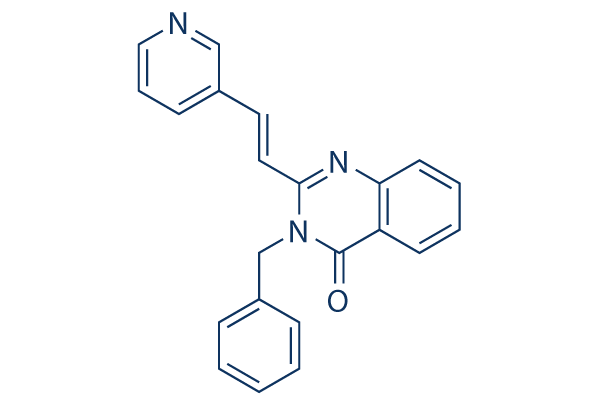All AbMole products are for research use only, cannot be used for human consumption.

In vitro: B02 is a specific inhibitor of human RAD51 recombinase, blocks HR repair in human embryonic kidney (HEK) and breast cancer cells and increases their sensitivity to a wide range of DNA damaging agents. Also, B02 enhances DNA damage and apoptosis induced by decitabine in MM cells. B02 shows high specificity for RAD51 and does not significantly inhibit RAD54 in the range of concentrations from 0 to 200 μM. B02 shows biological effect in human and mouse cells. In human embryonic kidney (HEK) cells, B02 disrupts RAD51 foci formation in response to DNA damage and inhibited DSB repair and DSB-dependent HR. B02 can also increase the sensitivity of cancer cells to chemotherapeutic DNA damaging agents. In vivo: B02 significantly increases the anti-tumor activity of cisplatin in vivo. B02 is tolerated by mice at doses up to 50 mg/kg without obvious body weight loss. No detectable morphological changes induced by B02 in kidneys and livers, main organs for detoxification are found.

Nat Protoc. 2021 Aug;16(8):3933-3953.
Multiplexed bioluminescence-mediated tracking of DNA double-strand break repairs in vitro and in vivo
B02 purchased from AbMole
| Cell Experiment | |
|---|---|
| Cell lines | The human MM cell lines NCI-H929 (H929), RPMI 8226, ARP-1, U266 and MM.1S cells |
| Preparation method | Proliferation of MM-cell lines is monitored by the WST-1 colorimetric cell-count assay. MM cell lines are seeded in 96-well plates at ~8000 cells/well. The cells are treated with or without B02 (10 μM) for 1 h, followed by treatment with vehicle (DMSO) or DOX (20-160 nM) for 72 h. WST-1 reagent is added to the culture medium in each well at a 1:10 ratio, and incubation continues at 37°C for 4 h. Relative cell number is estimated from absorbance at 450 nm using a spectrophotometer. |
| Concentrations | 10 μM |
| Incubation time | 1 h |
| Animal Experiment | |
|---|---|
| Animal models | NCR nude mice |
| Formulation | cremophor/DMSO/NS (1∶1∶3) |
| Dosages | 50 mg/kg |
| Administration | i.p. |
| Molecular Weight | 339.39 |
| Formula | C22H17N3O |
| CAS Number | 1290541-46-6 |
| Solubility (25°C) | 57 mg/mL in DMSO |
| Storage |
Powder -20°C 3 years ; 4°C 2 years In solvent -80°C 6 months ; -20°C 1 month |
| Related DNA/RNA Synthesis Products |
|---|
| Deoxyribonucleic Acid (from Salmon sperm)
Deoxyribonucleic Acid (from Salmon sperm) can be used as a research reagent, widely used in molecular biology, pharmacology and other scientific research. |
| GSK4418959
GSK4418959 (IDE275) is a non-covalent, reversible, selective and orally active WRN helicase inhibitor. GSK4418959 inhibits ATPase and DNA unwinding functions in an ATP-competitive manner. |
| Dencatistat
Dencatistat (P115) is an inhibitor of Cytidine Triphosphate Synthase 1 (CTPS1) with an IC50 value of ≤ 0.1 μM. |
| Antipain dihydrochloride
Antipain dihydrochloride is a protease inhibitor. Antipain dihydrochloride inhibits N-methyl-N'-nitro-N-nitrosoguanidine (MNNG)-induced transformation and increases chromosomal aberrations. Antipain dihydrochloride also restricts uterine DNA synthesis and function in mice. |
| Tetrahydrouridine
Tetrahydrouridine (THU) is potent inhibitor of cytidine deaminase (CDA), which competitively blocks the enzyme's active site more effectively than intrinsic cytidine. |
All AbMole products are for research use only, cannot be used for human consumption or veterinary use. We do not provide products or services to individuals. Please comply with the intended use and do not use AbMole products for any other purpose.


Products are for research use only. Not for human use. We do not sell to patients.
© Copyright 2010-2024 AbMole BioScience. All Rights Reserved.
